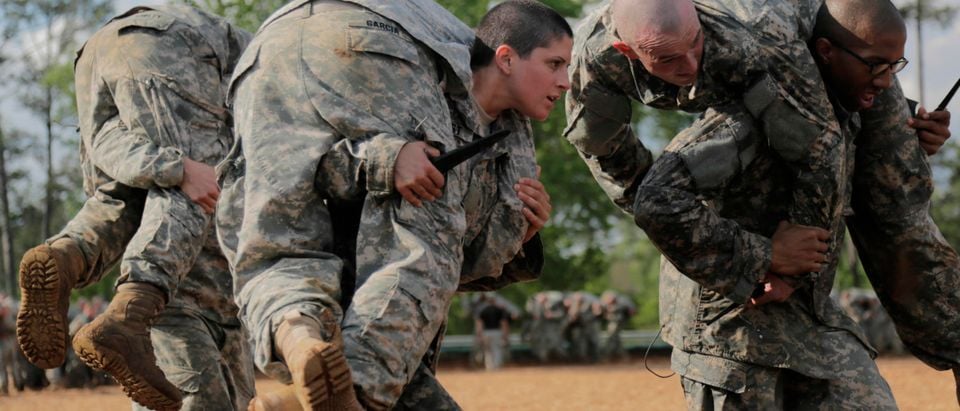Editor’s note: What follows is one in a two-part series of adapted excerpts from decorated veteran and conservative writer James Hasson’s new book Stand Down: How Social Justice Warriors Are Sabotaging America’s Military (Here at Barnes and Noble). The first part covers the intense training required for most Ranger candidates, and how that training was blunted internally by bureaucrats and military officials with an agenda. The second part, posted tomorrow, will cover the military’s response when news began to leak, and how they tried to cover up their malfeasance.
When the first integrated class started on April 19, none of the nineteen female candidates made it through the Darby phase of the course.
Eight were “recycled” back to the beginning of the phase to take a second crack at the course with the next class to show up, which is an entirely normal procedure. None of the eight passed on the second try. Of those eight, three candidates were given a third try but were required to start back at the very beginning and re-do RAP week, in what is known as a “Day One” recycled (as opposed to joining the next class after it completed RAP week, which is how the average recycle usually works).
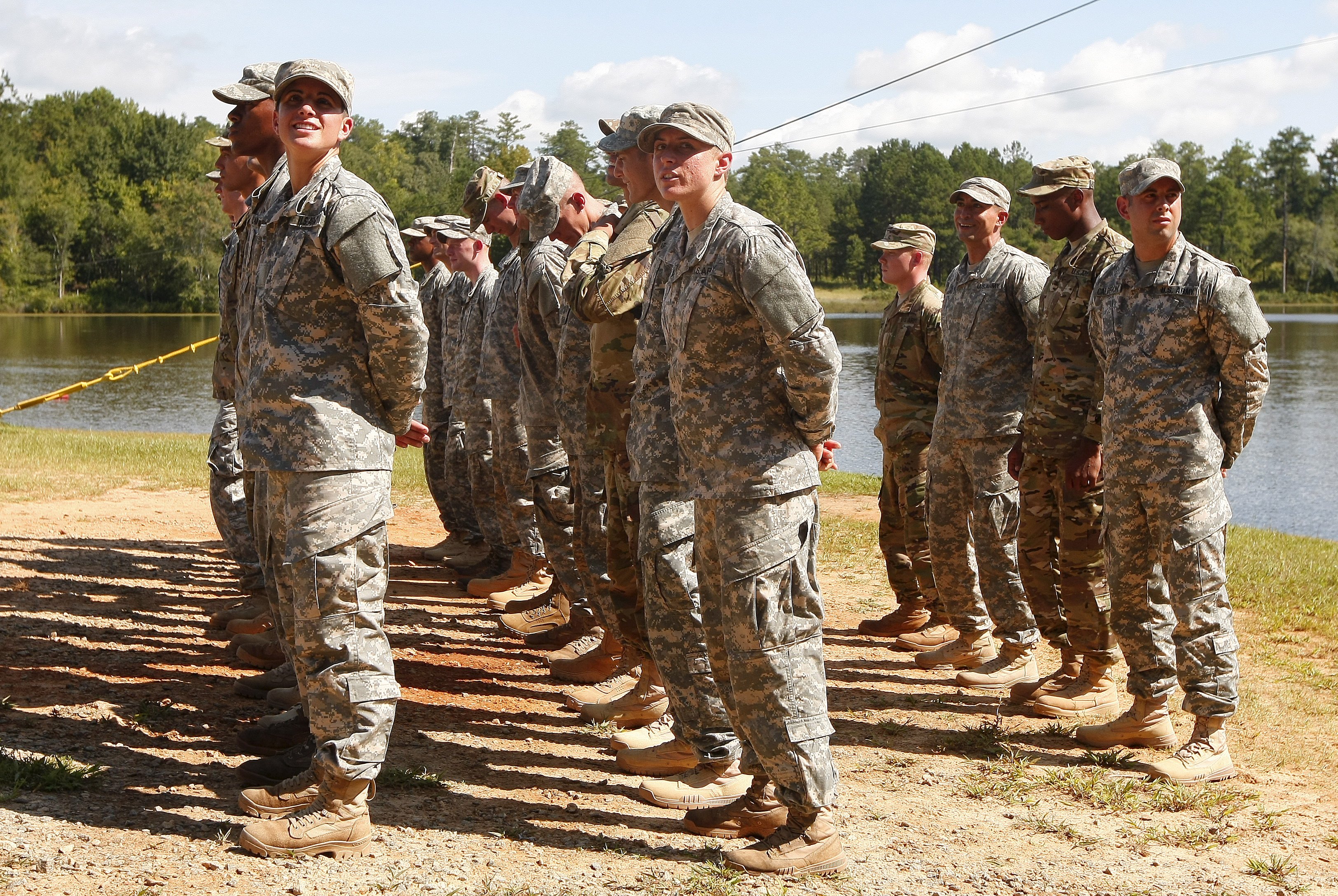
Capt. Kristen Griest of Orange, Connecticut (L) and 1st Lt. Shaye Haver of Copperas Cove, Texas (C) look towards the families at Ranger school graduation at Fort Benning in Columbus, Georgia August 21, 2015. Griest and Haver are the first two women U.S. Army Rangers to complete the school but cannot serve due to their gender. [REUTERS/Tami Chappell]
All of the changes I mentioned above led to perhaps the most egregious departure from Ranger School’s normally strict standards: the grading of candidates’ training missions during the course itself. The messages exchanged between RIs in the immediate aftermath of a female graduate’s patrol in the Mountain Phase of Ranger School, reproduced below, are a perfect illustration. The candidate was graded for her performance as the platoon sergeant for a nighttime raid. In non-training environments, the platoon sergeant is the senior enlisted soldier in the platoon, second in rank to the commissioned officer who serves as the platoon leader and, as any honest officer will tell you, second to none in authority. During dismounted operations, one of the platoon sergeant’s primary jobs is to account for all of the soldiers in the platoon, making sure no one is missing or left behind. In Ranger School, that role becomes even more critical at night, when the platoon is moving through dense terrain in the dark. The platoon sergeant will often move to the front of the platoon as it moves in single file and physically tap every soldier who passes. When the final elements of the patrol have passed, the platoon sergeant reports his head count.
The following two exchanges took place after the nighttime patrol, when the instructors had just learned that the female candidate had received a passing grade. The reason for the incredulity expressed in the messages was that the female candidate had been graded in the platoon sergeant role, a grade based almost entirely on her ability to keep track of all of the members of her platoon as they moved through the woods.
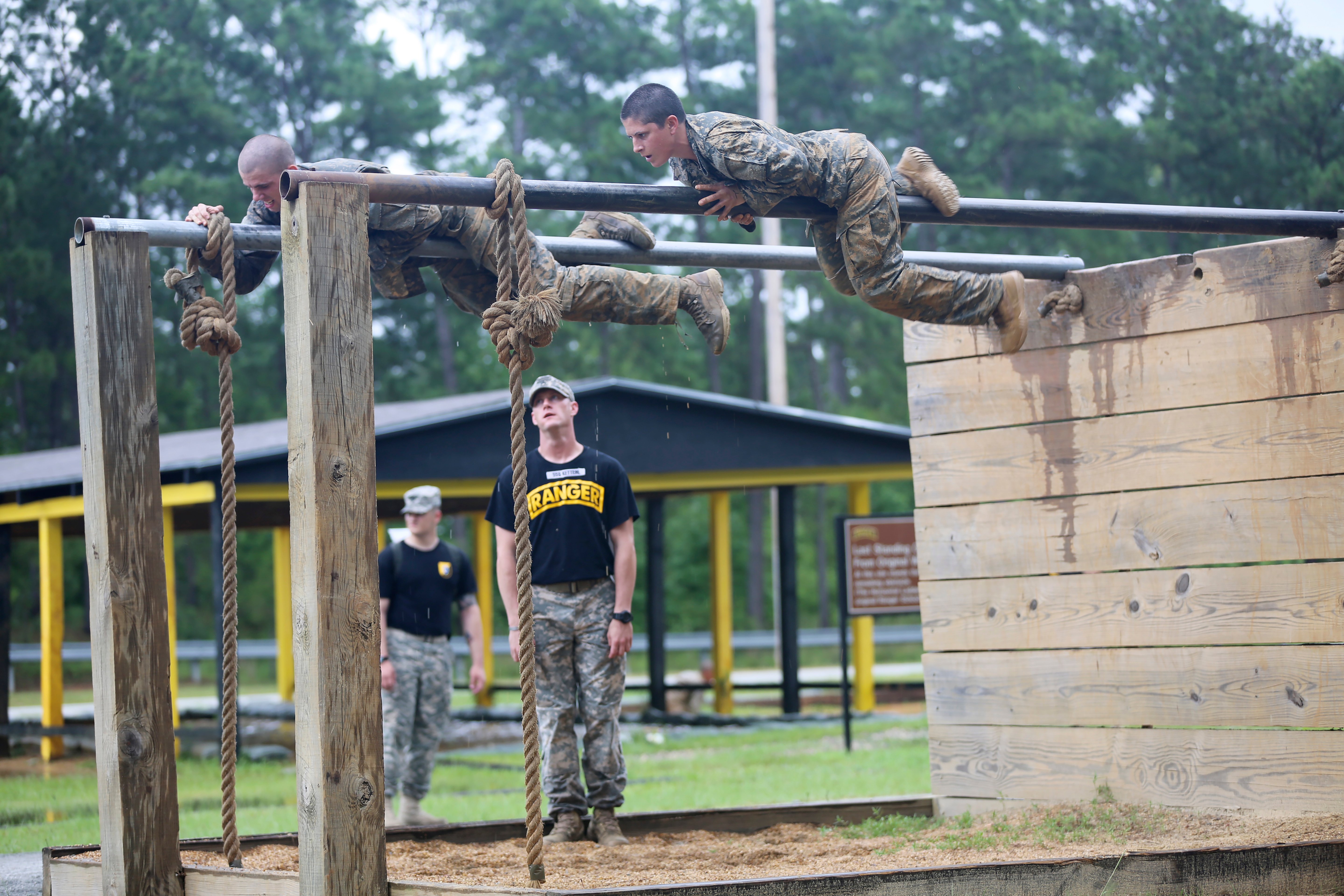
Captain Kristen Griest (R) participates in an obstacle course during training at the U.S. Army Ranger School on Ft. Benning Georgia, June 23, 2015. When two women completed the daunting U.S. Army Ranger school this week they helped end questions about whether women can serve as combat leaders, as the Pentagon is poised to open new roles, including elite Navy SEALs, to women in coming months. Army Captain Kristen Griest and First Lieutenant Shaye Haver on Tuesday completed a 62-day course including parachute jumps, helicopter assaults, swamp survival and small unit leadership that earned them a Ranger badge. Picture taken June 23, 2015. [REUTERS/U.S. Army/Staff Sgt. Scott Brooks/Handout]

The first text exchange describes what happened during the mission (a contemporaneous conversation that is confirmed by the leaked observation report of the same patrol):
Text Exchange One:
Ranger Instructor 1: Female got a “go” last night. I was out there. She shouldn’t have. But it happened and [redacted]
Ranger Instructor 2: Why did she get a go then?
Ranger Instructor 1: I was out there until actions on [that is, the raid or ambush the platoon was supposed to conduct]. Never happened because they missed their hit time. 1SG recocked them [that is, reset the mission conditions and gave them the chance to start over]. That never happened because she gave abad head count three times. We finally realized their [sic] was a missing student.
Ranger Instructor 1: Had to lock the [platoon] down and find this kid.
Ranger Instructor 3: That’s a definite go haha
Ranger Instructor 1: I thought after that the last nail was driven into the coffin. So I left.
Ranger Instructor 1: [The grading instructor] gave her a go at the end of the night. . . .
The second exchange is between two RIs discussing the pressure on the instructor to give the female candidate a passing grade on the patrol even though the candidate failed to accomplish the objective requirements of her position:
Text Exchange Two:
Ranger Instructor A: Another patrol in blue [that is, the candidate received a passing grade] get the fuck out of here
Ranger Instructor A: That’s a fail
Ranger Instructor A: That dudes [the grading instructor’s] spelling is like a 5th grader no wonder he got pressured into it
Ranger Instructor B: [Redacted.]
Ranger Instructor B: It’s all bullshit. On 8-35 [the mission they were on], they walk [sic] the road back into camp under RI control [that is, RIs took over from the candidate leadership and led the platoon to its destination on an open road rather than through the woods]
Ranger Instructor B: And lost a Ranger
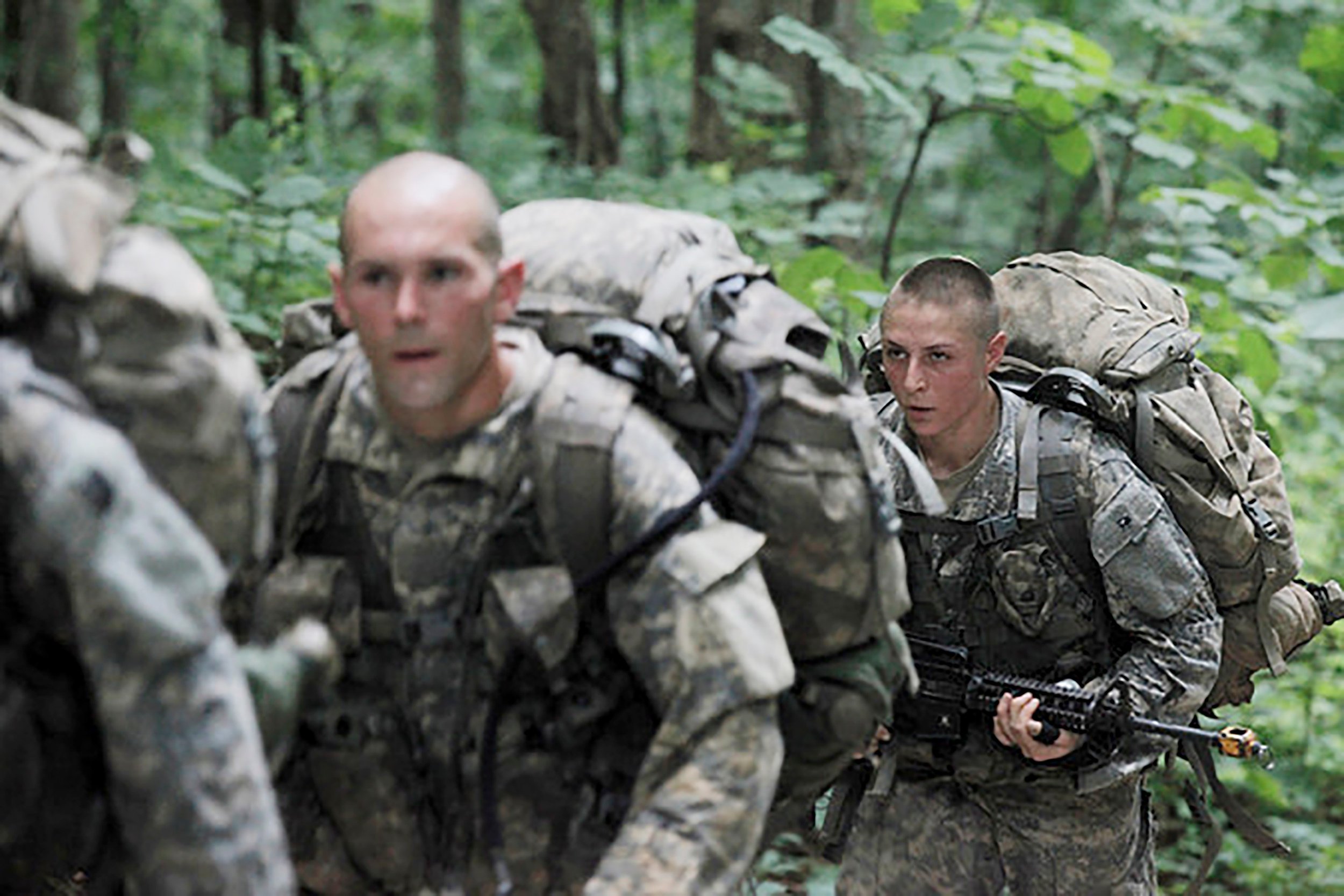
1st Lt. Shaye Haver (R) conducts Mountaineering training during the Ranger Course on Mount Yonah in Cleveland, Georgia July 14, 2015. When two women completed the daunting U.S. Army Ranger school this week they helped end questions about whether women can serve as combat leaders, as the Pentagon is poised to open new roles, including elite Navy SEALs, to women in coming months. Army Captain Kristen Griest and First Lieutenant Shaye Haver on Tuesday completed a 62-day course including parachute jumps, helicopter assaults, swamp survival and small unit leadership that earned them a Ranger badge. Picture taken July 14, 2015. [REUTERS/U.S. Army/Pfc. Ebony Banks/Handout]
[The candidate] passed her patrol primarily due to actions in the ORP and a high level of motivation throughout the patrol.
After taking over in the ORP, Ranger effectively completed ORP tasks on a severely restricted timeline. Due to failure on the part of the Leader’s Recon element, the platoon failed to make their hit time. A lost Ranger during retraining put an end to retraining. Prior to movement, Ranger brief[ed] the squad leaders on the route. Throughout movement, she constantly moved up and down the formation, attempting to keep the platoon together, a difficult task considering the terrain and overall condition of the patrol. She maintained S.A. [situational awareness] by pack count and disseminated it at choke points while maintaining 100% accountability. [Author’s Note: The report itself already admitted that the candidate “lost” another candidate, so obviously there was not “100% accountability”.]
Upon reaching the patrol base, the platoon was non-functional and was put to sleep, never going through the [Patrol Base] Establishment Process. (Emphasis added.)
According to multiple sources with firsthand knowledge, the candidate who became separated from the patrol was dropped from the course, as is standard practice, but the candidate responsible for ensuring that he did not become separated advanced to the next phase.
According to the Ranger School grading standards drilled into every Ranger instructor, when a member of the patrol becomes separated from the platoon and cannot be located, the platoon sergeant not only fails the patrol but also receives a “major minus” (essentially a “strike” in a “three-strike” policy), RI sources told me. As a source confirmed, “maintaining accountability [of the soldiers within the platoon] is basically the entire job,” and she failed to do that. (Moreover, passing a graded exercise in Ranger School depends on fulfilling a threshold number of specific technical and tactical tasks upon which candidates are evaluated, and motivation is not one of them.)
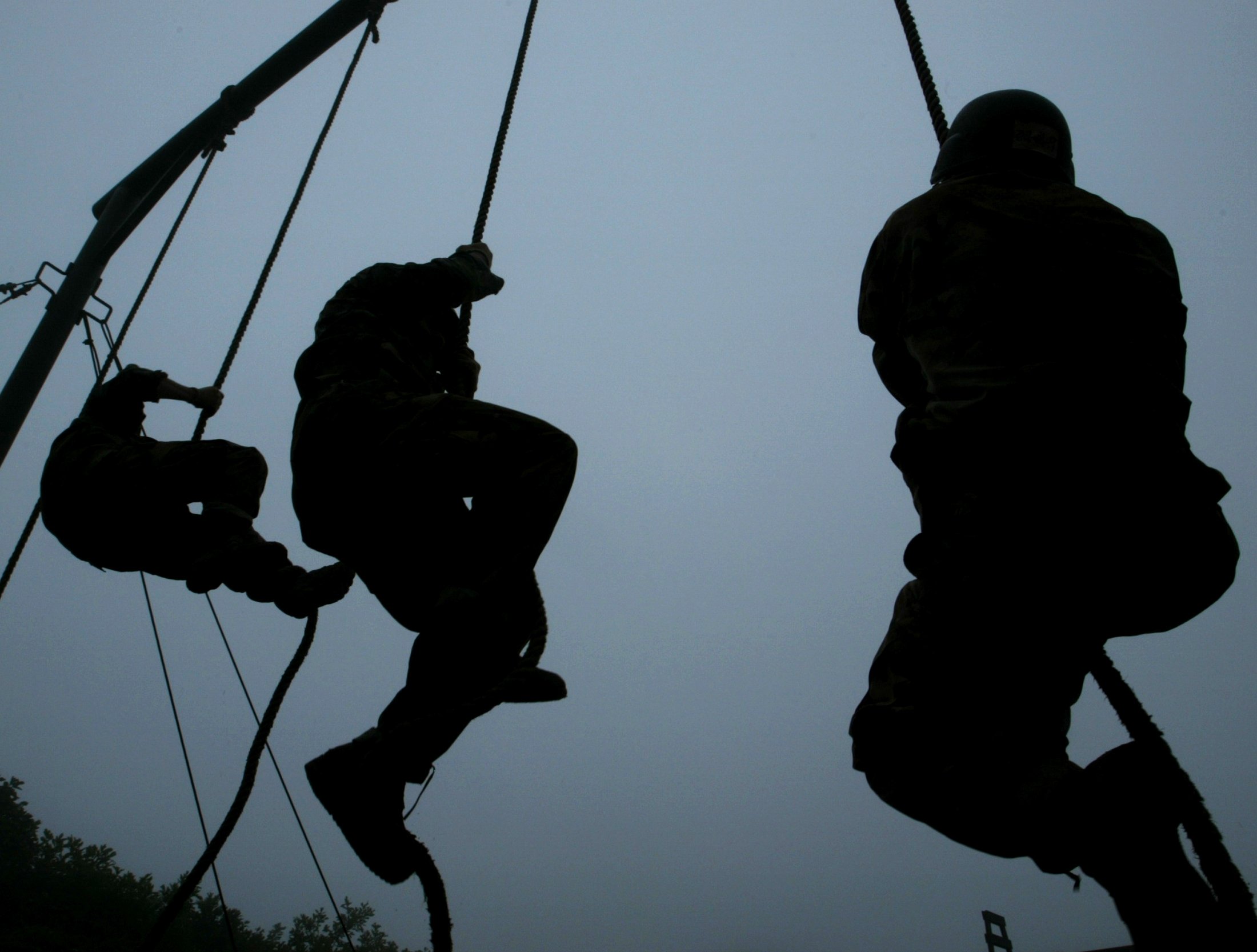
U.S. soldiers climb ropes during combined ranger training with the South Korean army in Paju, about 50 km (31 miles) north of Seoul, June 25, 2003 on the 53rd anniversary of the outbreak of the 1950-53 Korean war. About 37,000 U.S. troops are stationed in South Korea under a security alliance forged after the 1950-53 Korean War. [REUTERS/Kim Kyung-Hoon KKH/PB]
There were similar incidents during the Florida Phase—the third and final phase of Ranger School—as well.
An RI with firsthand knowledge of the candidate’s evaluation explains, “During clearance of the [objective], she lost control of her squad, leading to fratricide” (i.e. leading to what would have been a friendly-fire incident if live rounds were being used in a non-training environment.) Understandably, this normally earns a failing grade (an “immediate no-go”). But it didn’t here. He also said the squad left the casualty behind when it withdrew from the mission objective, normally another automatic no-go. The mission, he said, was a disaster. Nevertheless, the instructor overseeing the female candidate’s patrol gave her a passing grade. Every candidate on the mission reportedly received a no-go, except one—the female.
(The fratricide issue seemed to fit a pattern with the candidate’s first patrol in the Mountain Phase, which was an ambush that also resulted in fratricide. The candidate’s evaluation for that mission listed “fire control measures” as a weakness.) After the Florida mission, a verbal altercation reportedly broke out between RIs when some of the other instructors learned that the candidate in question had been given a passing grade despite committing errors that would objectively have caused an average candidate to fail.
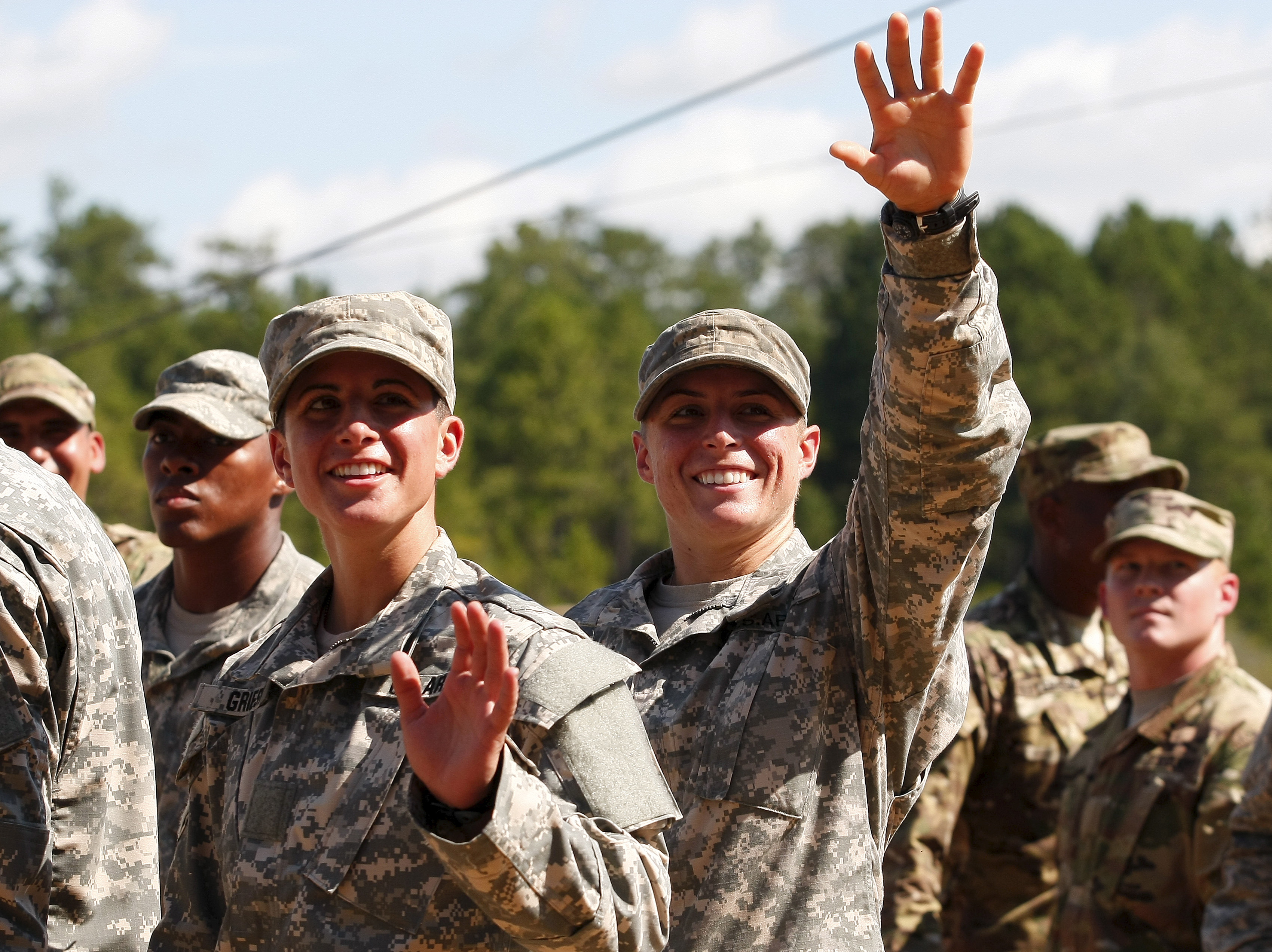
Capt. Kristen Griest of Orange, Connecticut (L) and 1st Lt. Shaye Haver of Copperas Cove, Texas wave to family and friends as they wait to receive their ranger tabs at Ranger school graduation at Fort Benning in Columbus, Georgia August 21, 2015. The two pioneering women made history on Friday as they became the first females to graduate from the Army’s elite and grueling 62-day Ranger school, at Fort Benning, Georgia. Though Haver and Griest are still not eligible to take part in front-line combat, according to reports, a decision on whether to change that policy could come in the fall. [REUTERS/Tami Chappell]
It is important to emphasize that those whom I interviewed expressed admiration for the graduating females’ grit and perseverance and were not critical of the female candidates’ character or commitment. The officers and enlisted soldiers I spoke to uniformly respected the female candidates’ efforts and willingness to put themselves through the rigors of Ranger training. They repeatedly emphasized that their critiques were intended simply to highlight how systematic political pressure forced changes to the legendary Ranger course, damaging its integrity, just as political pressure forced detrimental changes at every level of the military during the eight years of the Obama administration.
James Hasson, a former captain in the U.S. Army, is a graduate of the University of Notre Dame and the University of Virginia School of Law. He graduated from U.S. Army Ranger School and received the Bronze Star Medal in Afghanistan. He has worked with members of Congress on military issues, appeared on media programs from Tucker Carlson Tonight to National Public Radio, and is a frequent contributor to The Washington Examiner, The Federalist, and other publications.


